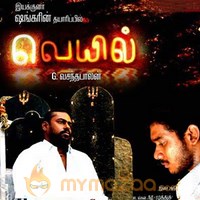
Veiyil Movie Reviews
| Starring | Bharath, Bhavana |
|---|---|
| Music | PrakashKumar GV |
| Director | Vasanthabalan |
| Producer | Shankar |
| Year | 2006 |
| Rating |
Veiyil Review
by MyMazaa.comLike the famous character in Anniyan, there are perhaps two personalities residing inside Shankar. One, a world famous director who specializes in dramatic, grand, larger than life movies. The other, a producer who backs talented directors-directors who pick out-of-the-box themes and give it a real-life feel and flavor.
Shankar did it with Kadhal. It was a soul-stirring deconstruction of love and its fallout in a particular milieu. Then there was Imsai Arasan. It was a historical comedy, a genre never heard before in India.
Now Shankar has again proved his nose for sensible story and honest treatment of it through Veyyil. In Vasanthabalan, he has found a formidable director who is ready to push the envelop far and firm. In an era of €˜punch dialogues€™ and massy adventures, Vasanthabalan has chosen to tell a tale of human foibles, frailties and faithfulness. Tales of heart are what make for satisfactory viewing. It surely does in Veyyil.
And Vasanthabalan€™s cast has given a bravura performance. Bharath is self-contained and understanding. Bhavana is petite and polished. Shriya Reddy is confident. Pasupathy is the nerve centre of the film. In a delightful role that is at once real and reflective, Pasupathy is spot on. No emotion is beyond his gritty face. Radiating the essence of the character, Pasupathy€™s eyes tell the story like no screenplay can ever narrate. Those windows to the soul carry the myriad human experience with dignity and decency.
Vasanthabalan€™s success also lies in smartly setting the mood for his method. The story is part told in the place the story unspools. The ambience gets across the story as much as the characters do.
The story is about Murugesan (Pasupathy). It is his life. It is his mistakes. It is his loss. It is his triumph. It is his way of coming to terms with his inner demons. It is a simple man€™s complicated life.
Murugesan, born into a family of two brothers and two sisters, is kindred spirit. A man of love and emotions. He is full of ardor for his brother Kathir (Bharath).
Murugesan also has a passion for movies €”MGR flicks attract him with a magic appeal. It kind of sets the tone for his life. The passion for MGR movies makes him cut classes and go to a theatre. But his dad catches him. Following a stern rebuke, Murugesan sets out on his own.
His journey is full of typical human turns and twists. He gets a job in a small theatre and falls for the charm of Dhanam, a local belle. But life has some nasty surprises for him. Dhanam dies, the theatre is brought down. It is an emotional cul-de-sac for Murugesan.
Looking to salvage the lost pieces of his life, Murugesan comes back to his home after two decades. The anguish of being a prodigal of sorts haunts Murugesan at every turn. His brother Kathir, now well settled and still doting on him, adds to his misery. Woven into this tapestry is the love strand of Meenakshi (Bhavana) and also that of Pandi (Shriya) for Murugesan. It is all flesh and blood as emotions pour out in profusion. At places, it is certainly maudlin and mushy, but the overall impact is genuine as the director has his intent clear. The story is about you and me and our neighbor. Honest treatment is its byword.
Pasupathy stands tall as we don€™t see him, only Murugesan is visible all through. It is the triumph of an actor who knows how to interpret a character. It is a triumph of a man who understands life in all its vignette-filled variations.
Bharath as Kathir shows his increasing maturity in handling a character that calls for subtlety and underplay. Bhavana is cute and convincing.
Pasupathy€™s father, a newcomer, is top class. He is an absolute delight in that dignified role. The equation between a loving father and a son, who fights between that love and his own inevitable impulses, is a story that will hold its own for years.
The music of G V Prakash is another rose in this fragrant bouquet. He has understood the situation and has come out with songs and background score with finesse. Muthukumar€™s lyrics get an extra coat of emotion in Prakash€™s hand. Madhi and Azhagappan have captured the village side of Virudhunagar in their lens that specks out vital and variegated details. Vasanthabalan has not let cinematic consideration come in the way of telling a story like it is. In a sense, he has just held a mirror to the lives of Murugesan and his family.
We are richer owing to the experience. The title Veyyil, representing sunny optimism, is doubly suitable. The film also reinforces your essential optimism that Tamil cinema is not dead yet.









